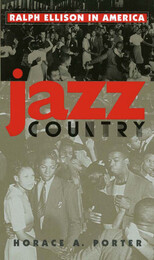2 books about Porter, Horace A.

Jazz Country
Ralph Ellison in America
Horace A. Porter
University of Iowa Press, 2001
Horace Porter is the chair of African American World Studies and professor of English at the University of Iowa. He is the author of Stealing Fire: The Art and Protest of James Baldwin and one of the editors of Call and Response: The Riverside Anthology of the African American Literary Tradition.
The first book to reassess Ralph Ellison after his death and the posthumous publication ofJuneteenth, his second novel, Jazz Country: Ralph Ellison in America explores Ellison's writings and views on American culture through the lens of jazz music.
Horace Porter's groundbreaking study addresses Ellison's jazz background, including his essays and comments about jazz musicians such as Louis Armstrong, Duke Ellington, and Charlie Parker. Porter further examines the influences of Ellington and Armstrong as sources of the writer's personal and artistic inspiration and highlights the significance of Ellison's camaraderie with two African American friends and fellow jazz fans—the writer Albert Murray and the painter Romare Bearden. Most notably, Jazz Country demonstrates how Ellison appropriated jazz techniques in his two novels, Invisible Man and Juneteenth.
Using jazz as the key metaphor, Porter refocuses old interpretations of Ellison by placing jazz in the foreground and by emphasizing, especially as revealed in his essays, the power of Ellison's thought and cultural perception. The self-proclaimed “custodian of American culture,” Ellison offers a vision of “jazz-shaped” America—a world of improvisation, individualism, and infinite possibility.
[more]

The Making of a Black Scholar
From Georgia to the Ivy League
Horace A. Porter
University of Iowa Press, 2003
This captivating and illuminating book is a memoir of a young black man moving from rural Georgia to life as a student and teacher in the Ivy League as well as a history of the changes in American education that developed in response to the civil rights movement, the war in Vietnam, and affirmative action. Born in 1950, Horace Porter starts out in rural Georgia in a house that has neither electricity nor running water. In 1968, he leaves his home in Columbus, Georgia—thanks to an academic scholarship to Amherst College—and lands in an upper-class, mainly white world. Focusing on such experiences in his American education, Porter's story is both unique and representative of his time.
The Making of a Black Scholar is structured around schools. Porter attends Georgia's segregated black schools until he enters the privileged world of Amherst College. He graduates (spending one semester at Morehouse College) and moves on to graduate study at Yale. He starts his teaching career at Detroit's Wayne State University and spends the 1980s at Dartmouth College and the 1990s at Stanford University.
The Making of a Black Scholar is structured around schools. Porter attends Georgia's segregated black schools until he enters the privileged world of Amherst College. He graduates (spending one semester at Morehouse College) and moves on to graduate study at Yale. He starts his teaching career at Detroit's Wayne State University and spends the 1980s at Dartmouth College and the 1990s at Stanford University.
Porter writes about working to establish the first black studies program at Amherst, the challenges of graduate study at Yale, the infamous Dartmouth Review, and his meetings with such writers and scholars as Ralph Ellison, Tillie Olsen, James Baldwin, and Henry Louis Gates, Jr. He ends by reflecting on an unforeseen move to the University of Iowa, which he ties into a return to the values of his childhood on a Georgia farm. In his success and the fulfillment of his academic aspirations, Porter represents an era, a generation, of possibility and achievement.
[more]
READERS
Browse our collection.
PUBLISHERS
See BiblioVault's publisher services.
STUDENT SERVICES
Files for college accessibility offices.
UChicago Accessibility Resources
home | accessibility | search | about | contact us
BiblioVault ® 2001 - 2024
The University of Chicago Press









